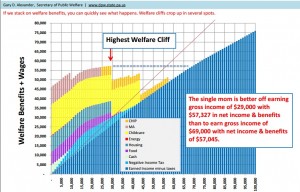We’re making a tiny bit of progress in the battle against the welfare state. No, policy hasn’t changed yet, but at least there’s growing recognition that maybe, just maybe, it’s not a good idea to pay people not to work. Particularly when you trap them in lives of dependency and despair and undermine progress in the fight against poverty.
 This chart shows that various handouts discourage low-income people from earning more money, and a recent blockbuster study from a couple of my colleagues at the Cato Institute revealed that welfare pays more than entry-level employment in dozens of states.
This chart shows that various handouts discourage low-income people from earning more money, and a recent blockbuster study from a couple of my colleagues at the Cato Institute revealed that welfare pays more than entry-level employment in dozens of states.
And a growing number of people are now aware that there’s been an explosion of food stamp dependency, so one hopes that all this knowledge eventually will translate into a new round of welfare reform.
Why am I optimistic? Well, because awareness already is leading to change in some very unexpected places. Even Scandinavian nations are realizing that there has to be a limit to incentive-killing and taxpayer-sapping redistribution.
Here are some excerpts from a remarkable Bloomberg report about developments in Denmark.
“We live in a world of global competition for jobs,” the 40-year-old minister said in an interview in Copenhagen. “For any finance minister wanting to be taken seriously, it’s something to deal with. That requires a modernization of the welfare state.” The AAA rated nation, whose economy contracted 0.2 percent in the first half, needs to contain welfare spending or risk losing the respect of investors, Corydon said. Danes, who like Swedes and Norwegians, are used to generous jobless pay as well as state-financed education and health care, need to learn that those privileges come at a cost, he said. …Denmark’s challenge now is to ensure its welfare habits don’t leave it unable to compete with populations that work harder at a lower cost, he said.
That’s a noteworthy passage, both because the Danish Finance Minister recognizes jurisdictional competition as a check on the welfare state (something confirmed by a study from German economists) and because Denmark is ruled by Social Democrats.
Yet even these leftists are grasping that it makes no sense to have a system that generates perverse incentives.
…out-of-work Danes in some cases earn even more than those in low-skilled jobs. An Aug. 27 report by the Economy Ministry showed that about 250,000 Danes have no economic incentive to give up their unemployment benefits and take a job. That compares with 2.64 million people in full- and part-time jobs, according to Statistics Danmark. …The Social Democrat-led coalition of Prime Minister Helle Thorning-Schmidt, in office since 2011, has pushed through cuts including limiting unemployment benefits to two years from four years.
It’s hardly radical libertarianism to reduce unemployment benefits from four years to two years, but it is rather significant when even politicians realize that it’s not good – as illustrated by these powerful cartoons – to lure people into the wagon when nations need more people pulling the wagon.
The article even mentions “Lazy Robert,” a famous deadbeat who became the first Danish member of the Moocher Hall of Fame last April. No wonder Danes may be saying that enough is enough.
There’s even a bit of good news on the tax side of the fiscal ledger.
The government has responded to the economic slump by cutting the corporate tax rate, as well as some other taxes.
Sounds like Danish policy makers could give some lessons to their self-destructive American counterparts.
But you won’t be surprised to learn that there’s still plenty of bad policy in Denmark. The politicians can’t resist, for instance, the siren song of Keynesian economics.
It plans to spend 44 billion kroner ($7.8 billion) next year on building railroads, highways and hospitals. …Corydon,…said he wants to keep public investments close to a 30-year high to create jobs.
By the way, it’s a bit depressing that Denmark actually ranks higher than the United States in the most recent Economic Freedom of the World rankings.
Yes, their welfare state is too big, their tax system is a nightmare, and they are saddled with one of the world’s most expensive bureaucracies, but Denmark has ultra-free market policies in other areas.
But even those laissez-faire policies no longer are apparently enough to compensate for bad fiscal policy.
P.S. Denmark may have Lazy Robert, but the United Kingdom has Natailija, Tracey, Anjem, and Gina and Danny, so if there was a welfare Olympics, the U.K. would have a lot more medals.
P.P.S. Speaking of poverty, you may be surprised that bureaucrats at the OECD assert that America has more poverty than some very poor nations. But that’s only because the Paris-based bureaucracy is trying to advance Obama’s redistribution agenda by redefining poverty to mean differences in income rather than lack of income. Sort of makes you wonder why we’re subsidizing their statist agenda with our tax dollars.
